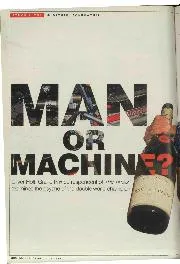

Man or Machine?
Oliver Holt, Grand Prix correspondent of The Times, examines the psyche of the double world champion Just when there was a chink of light, a fleeting, fleeing glimpse of vulnerability,…
EDITORIAL.
PASSENGERS MUST BE BARRED!
THE disastrous meeting at Donington Park on August 19th, when one passenger-mechanic was killed and another gravely injured, brings under discussion once more the question of whether it is necessary to have a crew of two in a racing car.
This problem was the subject of heated arguments many years ago on the Continent after several accidents had occurred in which mechanics had met their deaths while drivers had escaped unscathed. Since that date mechanics have been “dropped,” and nowadays the driver is the sole occupant of a racing car’s cockpit in Grand Prix races abroad.
So high is the average speed in modern motor-racing that the old use of a mechanic in effecting roadside repairs no longer applies. His chief use nowadays is for warning the driver that another competitor wishes to pass, and it is for this purpose that every bonington driver carries a passenger-mechanic. The Continental alternative to this method of ensuring that there shall be no baulking by slow cars is an exten
use Armed with a blue flag, these officials are placed at intervals all round the course, and whenever they see a faster car being hindered by a slow vehicle the flag is vigorously waved at the offending driver. The driver of the fast car can, if he requires, signify his desire to pass by raising his arm. Although the Donington Park circuit, with its frequent curves and short straights presents difficulties in this direction, we do not think that it would be impossible to operate the system there. One thing is certain : the carrying of passengers must be for
bidden in future, for loss of life and serious injuries are too high a price to pay for the benefit of avoiding baulki ng.
We are fully aware that in drawing attention to this subject we are laying ourselves open to the criticism by experienced drivers of expressing unnecessary alarm. We agree with them that experienced drivers do not come to grief at Darlington Park, but the point is that few of the Donington drivers come under this category. The meetings there can be of great value as a trainingground for beginners, and they, being the weakest links in the chain, are the standard by which safety-regulations must be formulated.
In the majority of motor-racing accidents the mechanic is far more seriously injured than the driver. On August 19th neither of the drivers received more than superficial injuries, which would have been the sum total of casualties if passengers had been barred. A motor-racing death offers.mlimited scope for the scare-writers of the popular Press, but fortunately the Donington accidents es
caped unwelcome publicity.
But if the frequent accidents at Donington Park are not to attract the attention of the Daily Press as being typical of the danger of motor-racing, steps must be taken to avoid them, and we earnestly offer this solution of the problem by flagmarshals for the consideration of the organisers.
In conclusion, accidents might be avoided if the regulations concerning eligibility were tightened up. Qvalifying practice-laps, as well as races, should be observed at various points by a group of experienced drivers, with powers to exclude wild drivers.